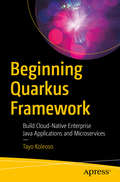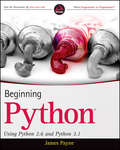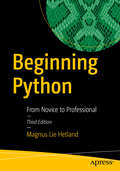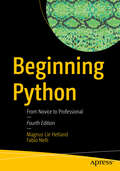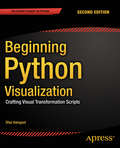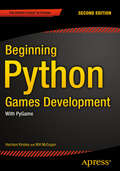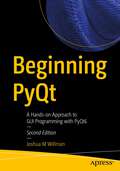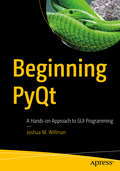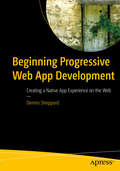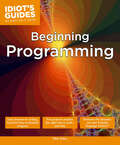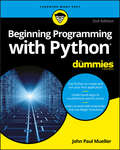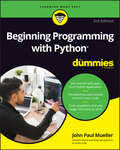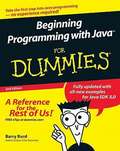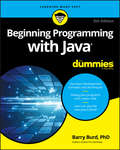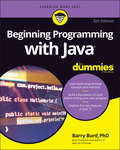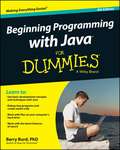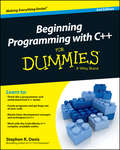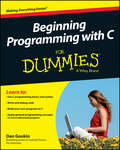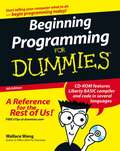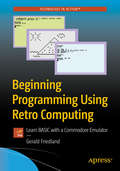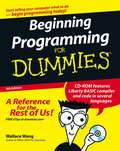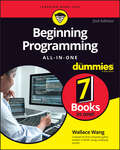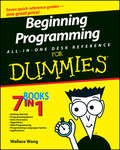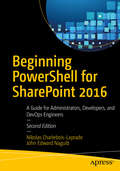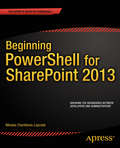- Table View
- List View
Beginning Quarkus Framework: Build Cloud-Native Enterprise Java Applications and Microservices
by Tayo KoleosoHarness the power of Quarkus, the supersonic subatomic cloud-native Java platform from Red Hat. This book covers everything you need to know to get started with the platform, which has been engineered from the ground up for superior performance and cloud-native deployment. You’ll start with an overview of the Quarkus framework and its features. Next, you'll dive into building your first microservice using Quarkus, including the use of JAX-RS, Swagger, Microprofile, REST, reactive programming, and more. You’ll see how to seamlessly add Quarkus to existing Spring framework projects. The book continues with a dive into the dependency injection pattern and how Quarkus supports it, working with annotations and facilities from both Jakarta EE CDI and the Spring framework. You’ll also learn about dockerization and serverless technologies to deploy your microservice. Next you’ll cover how data access works in Quarkus with Hibernate, JPA, Spring Boot, MongoDB, and more. This will also give you an eye for efficiency with reactive SQL, microservices, and many more reactive components. You’ll also see tips and tricks not available in the official documentation for Quarkus. Lastly, you'll test and secure Quarkus-based code and use different deployment scenarios to package and deploy your Quarkus-based microservice for the cloud, using Amazon Web Services as a focus. After reading and using Beginning Quarkus Framework, you'll have the essentials to build and deploy cloud-native microservices and full-fledged applications. Author Tayo Koleoso goes to great lengths to ensure this book has up to date material including brand new and some unreleased features! What You Will Learn Build and deploy cloud-native Java applications with Quarkus Create Java-based microservices Integrate existing technologies such as the Spring framework and vanilla Java EE into the Quarkus framework Work with the Quarkus data layer on persistence with SQL, reactive SQL, and NoSQL Test code in Quarkus with the latest versions of JUnit and Testcontainers Secure your microservices with JWT and other technologies Package your microservices with Docker containers and GraalVM native image toolingTips and techniques you won't find in the official Quarkus documentation Who This Book Is For Intermediate Java developers familiar with microservices, the cloud in general, and REST web services, but interested in modern approaches.
Beginning Python®
by James PayneBeginning Python: Using Python 2. 6 and Python 3. 1 introduces this open source, portable, interpreted, object-oriented programming language that combines remarkable power with clear syntax. This book enables you to quickly create robust, reliable, and reusable Python applications by teaching the basics so you can quickly develop Web and scientific applications, incorporate databases, and master systems tasks on various operating systems, including Linux, MAC OS, and Windows. You'll get a comprehensive tutorial that guides you from writing simple, basic Python scripts all the way through complex concepts, and also features a reference of the standard modules with examples illustrating how to implement features in the various modules. Plus, the book covers using Python in specific program development domains, such as XML, databases, scientific applications, network programming, and Web development. Note: CD-ROM/DVD and other supplementary materials are not included as part of eBook file.
Beginning Python: From Novice to Professional (Novice To Pro Ser.)
by Magnus Lie HetlandGain a fundamental understanding of Python's syntax and features with the second edition of Beginning Python, an up-to-date introduction and practical reference. Covering a wide array of Python-related programming topics, including addressing language internals, database integration, network programming, and web services, you'll be guided by sound development principles. Ten accompanying projects will ensure you can get your hands dirty in no time. Updated to reflect the latest in Python programming paradigms and several of the most crucial features found in Python 3. 0 (otherwise known as Python 3000), advanced topics, such as extending Python and packaging/distributing Python applications, are also covered. What you'll learn Become a proficient Python programmer by following along with a friendly, practical guide to the language's key features Write code faster by learning how to take advantage of advanced features such as magic methods, exceptions, and abstraction Gain insight into modern Python programming paradigms including testing, documentation, packaging, and distribution Learn by following along with ten interesting projects, including a P2P file-sharing application, chat client, video game, remote text editor, and more Complete, downloadable code is provided for each project! Who this book is for Programmers, novice and otherwise, seeking a comprehensive introduction to the Python programming language.
Beginning Python: From Novice to Professional
by Magnus Lie Hetland Fabio NelliGain a fundamental understanding of Python’s syntax and features with this revised introductory and practical reference. Covering a wide array of Python–related programming topics, including addressing language internals, database integration, network programming, and web services, you’ll be guided by sound development principles. Updated to reflect the latest in Python programming paradigms and several of the most crucial features found in Python 3, Beginning Python, Fourth Edition also covers advanced topics such as extending Python and packaging/distributing Python applications. Ten accompanying projects will ensure you can get your hands dirty in no time. You will: Become a proficient Python programmer by following along with a friendly, practical guide to the language’s key features Write code faster by learning how to take advantage of advanced features such as magic methods, exceptions, and abstraction Gain insight into modern Python programming paradigms including testing, documentation, packaging, and distribution Work through several interesting projects, including a P2P file–sharing application, chat client, video game, remote text editor, and more Who This Book Is For Programmers, novice and otherwise, seeking a comprehensive introduction to the Python programming language.
Beginning Python Visualization: Crafting Visual Transformation Scripts
by Shai VaingastWe are visual animals. But before we can see the world in its true splendor, our brains, just like our computers, have to sort and organize raw data, and then transform that data to produce new images of the world. Beginning Python Visualization: Crafting Visual Transformation Scripts, Second Edition discusses turning many types of data sources, big and small, into useful visual data. And, you will learn Python as part of the bargain. In this second edition you'll learn about Spyder, which is a Python IDE with MATLAB(R) -like features. Here and throughout the book, you'll get detailed exposure to the growing IPython project for interactive visualization. In addition, you'll learn about the changes in NumPy and Scipy that have occurred since the first edition. Along the way, you'll get many pointers and a few visual examples. As part of this update, you'll learn about matplotlib in detail; this includes creating 3D graphs and using the basemap package that allows you to render geographical maps. Finally, you'll learn about image processing, annotating, and filtering, as well as how to make movies using Python. This includes learning how to edit/open video files and how to create your own movie, all with Python scripts. Today's big data and computational scientists, financial analysts/engineers and web developers - like you - will find this updated book very relevant.
Beginning Python Games Development: With PyGame (Novice To Pro Ser.)
by Harrison Kinsley Will McguganLearn how to create compelling games using Python and the PyGame games development library. Beginning Python Games Development, Second Edition will teach you how to create visuals, do event handling, create 3D games, add media elements, and integrate OpenGL into your Python game. In this update to the first ever book to cover the popular open source PyGame games development library, you'll stand to gain valuable technical insights and follow along with the creation of a real-world, freely downloadable video game. Written by industry veterans and Python experts Will McGugan and Harrison Kinsley, this is a comprehensive, practical introduction to games development in Python. You can also capitalize upon numerous tips and tricks the authors have accumulated over their careers creating games for some of the world's largest game developers. What you'll learn How to use PyGame with Python for game development How to create visuals; do event handling; and more How to do 3D game development using Python How to add media elements How to create visually dynamic backgrounds by integrating some OpenGL and more into your Python-based game How to build a game project step by step Who this book is for This book is for Python coders wanting to learn how to build their first games. Game developers who may be new to Python and PyGame can use this book; a Python primer is included. Table of Contents 1. Introducing Python 2. Exploring Python 3. Introducing Pygame 4. Creating Visuals 5. Making Things Move 6. Accepting User Input 7. Take Me to Your Leader 8. Moving into the Third Dimension 9. Exploring the Third Dimension 10. Making Things Go Boom 11. Lights, Camera, Action! 12. Setting the Scene with OpenGL Appendix A: Game Object Reference Appendix B: Packaging Your Game
Beginning PyQt: A Hands-on Approach to GUI Programming with PyQt6
by Joshua M WillmanLearn GUI application development from the ground up by building simple projects that teach the fundamentals of using PyQt6. This 2nd edition includes updated code, programs, and new chapters to get you started using the newest version. Taking a practical approach, each chapter will gradually teach more advanced and diverse concepts to aid you in designing and customizing interesting and professional applications.You'll start by learning important concepts related to GUI development, and then jump right into building different and exciting projects in every chapter. Along the way, you’ll discover new widgets, layouts, and other concepts that will help you to build better UIs. You'll also construct more elaborate GUIs, covering topics that include storing data using the clipboard, graphics and animation, support for SQL databases, multithreading applications, and building modern-looking interfaces. Using this knowledge, you’ll be able to build a photo editor, games, a text editor, a working web browser, and an assortment of other GUIs. In the end, this book will guide you through the process of creating UIs to help you bring your own ideas to life. Find out what you need to begin making your own applications with PyQt! What You'll LearnDevelop cross-platform UIs with PyQt and PythonUse PyQt’s many widgets and apply them by building real applicationsBuild larger applications through a step-by-step approach and break the code into smaller chunks for deeper understandingWork with more complex applications in PyQt, covering SQL databases, multithreading, web browsers, and moreCreate modern-looking UIs with Qt Quick and QtQml using the latest version of PyQtWho This Book Is ForPython developers who are looking to begin creating user interfaces and want to utilize the latest version of PyQt to gets started. Having prior knowledge of PyQt or other Python UI toolkits is not necessary to begin using this book.
Beginning PyQt: A Hands-on Approach to GUI Programming
by Joshua M. WillmanLearn GUI application development from the ground up, taking a practical approach by building simple projects that teach the fundamentals of using PyQt. Each chapter gradually moves on to teach more advanced and diverse concepts to aid you in designing interesting applications using the latest version of PyQt. You’ll start by reviewing the beginning steps of GUI development from, using different projects in every chapter to teach new widgets or concepts that will help you to build better UIs. As you follow along, you will construct more elaborate GUIs, covering topics that include storing data using the clipboard, graphics and animation, support for SQL databases, and multithreading applications. Using this knowledge, you’ll be able to build a photo editor, games, a text editor, a working web browser and an assortment of other GUIs. Beginning PyQt will guide you through the process of creating UIs to help you bring your own ideas to life. Learn what is necessary to begin making your own applications and more with PyQt! What You'll LearnCreate your own cross-platform GUIs with PyQt and PythonUse PyQt’s many widgets and apply them to building real applicationsBuild larger applications and break the steps into smaller parts for deeper understandingWork with complex applications in PyQt, from animation to databases and more Who This Book Is ForIndividuals who already have a fundamental understanding of the Python programming language and are looking to either expand their skills in Python or have a project where they need to create a UI, but may have no prior experience or no idea how to begin.
Beginning Progressive Web App Development: Creating a Native App Experience on the Web
by Dennis SheppardBuild fast, reliable web applications using the latest web development technologies. This book provides step-by-step learning through the process of transforming a "traditional" web app into a high-performing progressive web app, leveraging principles and lessons taught throughout the book. You will learn to improve the performance, reliability, reach, and user engagement of mobile web applications through the use of specific, practical examples. Because most non-trivial web applications developed today use JavaScript frameworks, you will learn about the most popular frameworks offering a PWA right out of the box, including React, Preact, Vue. js, Angular, and Ionic. You also will learn which tools to enlist to measure your application's performance, such as Google's Lighthouse. Beginning Progressive Web App Development includes best practices to make your app work even when an end user has a poor or no Internet connection, and to send notifications and reminders with the Notification and Push APIs to keep your users engaged. You will come away with an understanding of the technologies--application shells, server push technology, and caching--that will allow you to rapidly deliver content to your users. As important as it is to provide mobile users with a great experience, the principles of PWAs are not limited to smartphones. Most of what you will learn in this book is directly applicable to web applications on all screen sizes. What You'll Learn Achieve nearly instant loading times Implement service workers to make your app load faster and work while users are offline Keep users engaged with web notifications Measure the performance and reach of your web applications Transform your existing web app into a progressive web app Create a progressive web app from scratch Understand what building a truly fast web app entails with Google's PRPL pattern Who This Book Is For Web developers with prior JavaScript experience
Beginning Programming: Easy Lessons on Coding, from First Line to Finished Program (Idiot's Guides)
by Matt TellesIdiot's Guides: Beginning Programming takes the fear out of learning programming by teaching readers the basics with Python, an open-source (free) environment which is considered one of the easiest languages to learn. Readers will learn not only the "how" of programming in Python, but the "why," so they understand how the code really works and how it relates to other programming languages. Included are simple coding projects that reinforce lessons.
Beginning Programming with Python For Dummies
by John Paul MuellerThe easy way to learn programming fundamentals with Python Python is a remarkably powerful and dynamic programming language that's used in a wide variety of application domains. Some of its key distinguishing features include a very clear, readable syntax, strong introspection capabilities, intuitive object orientation, and natural expression of procedural code. Plus, Python features full modularity, supporting hierarchical packages, exception-based error handling, and modules easily written in C, C++, Java, R, or .NET languages, such as C#. In addition, Python supports a number of coding styles that include: functional, imperative, object-oriented, and procedural. Due to its ease of use and flexibility, Python is constantly growing in popularity—and now you can wear your programming hat with pride and join the ranks of the pros with the help of this guide. Inside, expert author John Paul Mueller gives a complete step-by-step overview of all there is to know about Python. From performing common and advanced tasks, to collecting data, to interacting with package—this book covers it all! Use Python to create and run your first application Find out how to troubleshoot and fix errors Learn to work with Anaconda and use Magic Functions Benefit from completely updated and revised information since the last edition If you've never used Python or are new to programming in general, Beginning Programming with Python For Dummies is a helpful resource that will set you up for success.
Beginning Programming with Python For Dummies
by John Paul MuellerCreate simple, easy programs in the popular Python language Beginning Programming with Python For Dummies is the trusted way to learn the foundations of programming using the Python programming language. Python is one of the top-ranked languages, and there&’s no better way to get started in computer programming than this friendly guide. You&’ll learn the basics of coding and the process of creating simple, fun programs right away. This updated edition features new chapters, including coverage of Google Colab, plus expanded information on functions and objects, and new examples and graphics that are relevant to today&’s beginning coders. Dummies helps you discover the wealth of things you can achieve with Python. Employ an online coding environment to avoid installation woes and code anywhere, any time Learn the basics of programming using the popular Python language Create easy, fun projects to show off your new coding chops Fix errors in your code and use Python with external data sets Beginning Programming with Python For Dummies will get new programmers started—the easy way.
Beginning Programming with Java For Dummies, 2nd Edition
by Barry BurdCovering everything from basic Java development concepts to the latest tools and techniques used in Java, this book will put would-be programmers on their way to Java mastery Explores what goes into creating a program, how to put the pieces together, dealing with standard programming challenges, debugging, and making it work Updated for the release of the Java SDK 2. 0, with all examples revised to reflect the changes in the technology
Beginning Programming with Java For Dummies
by Barry A. BurdLearn to speak the Java language like the pros Are you new to programming and have decided that Java is your language of choice? Are you a wanna-be programmer looking to learn the hottest lingo around? Look no further! Beginning Programming with Java For Dummies, 5th Edition is the easy-to-follow guide you'll want to keep in your back pocket as you work your way toward Java mastery! In plain English, it quickly and easily shows you what goes into creating a program, how to put the pieces together, ways to deal with standard programming challenges, and so much more. Whether you're just tooling around or embarking on a career, this is the ideal resource you'll turn to again and again as you perfect your understanding of the nuances of this popular programming language. Packed with tons of step-by-step instruction, this is the only guide you need to start programming with Java like a pro. Updated for Java 9, learn the language with samples and the Java toolkit Familiarize yourself with decisions, conditions, statements, and information overload Differentiate between loops and arrays, objects and classes, methods, and variables Find links to additional resources Once you discover the joys of Java programming, you might just find you're hooked. Sound like fun? Here's the place to start.
Beginning Programming with Java For Dummies
by Barry BurdBecome a Java wizard with this popular programming guide Consider Beginning Programming with Java For Dummies your indispensable guide to learning how to program in one of the most popular programming languages—Java! Java is an invaluable language to master, as it’s widely used for application development, including Android, desktop, and server-side applications. Beginning Programming with Java For Dummies is written specifically for newbies to programming. The book starts with an overview of computer programming and builds from there; it explains the software you need, walks you through writing your own programs, and introduces you to a few of the more-complex aspects of programming in Java. It also includes step-by-step examples you can try on your own (and email the author if you need help). As you work through the book, you’ll get smart about these Java features: Object-oriented programming (OOP), a Java mainstay IntelliJ IDEA, an integrated development environment (IDE), that gives you one place to do all your programming, including debugging code Loops, branches, and collections Variables and operators Expressions, statements, and blocks Beginning Programming with Java For Dummies translates all this foreign programming and computer syntax into plain English, along with plenty of helpful examples and tips. Learning a new language—and coding is definitely its own language—should be a fun endeavor. With this book as your handy interpreter, you’ll be on your way to fluency, speaking the language of coders everywhere!
Beginning Programming with Java For Dummies
by BurdOne of the most popular beginning programming books, now fully updated Java is a popular language for beginning programmers, and earlier editions of this fun and friendly guide have helped thousands get started. Now fully revised to cover recent updates for Java 7.0, Beginning Programming with Java For Dummies, 3rd Edition is certain to put more first-time programmers and Java beginners on the road to Java mastery.Explores what goes into creating a program, putting the pieces together, dealing with standard programming challenges, debugging, and making the program work Offers new options for tools and techniques used in Java developmentProvides valuable information and examples for the would-be programmer with no Java experienceAll examples are updated to reflect the latest changes in Java 7.0Beginning Programming with Java For Dummies, 3rd Edition offers an easy-to-understand introduction to programming through the popular, versatile Java 7.0 language.
Beginning Programming with C++ For Dummies
by Stephen R. DavisAn ideal starting point to get a strong grasp of the fundamentals of C++C++ is an object-oriented programming language commonly adopted by would-be programmers. This book explores the basic development concepts and techniques of C++ and explains the "how" and "why" of C++ programming from the ground up.You'll discover what goes into creating a program, as well as how to put the various pieces together, deal with standard programming challenges, handle debugging, and make it all work.Details the basics of C++ programming and explores the "how" and "why" of this object-oriented languageAddresses the various components that go into creating a program with C++Walks you through common challenges of C++ programmingAssuming no prior experience, Beginning Programming with C++ For Dummies is a fun and friendly guide to learning the C++ language.Note: CD-ROM/DVD and other supplementary materials are not included as part of eBook file.
Beginning Programming with C For Dummies
by Dan GookinLearn the basics of programming with C with this fun and friendly guide!C offers a reliable, strong foundation for programming and serves as a stepping stone upon which to expand your knowledge and learn additional programming languages. Written by veteran For Dummies author Dan Gookin, this straightforward-but-fun beginner's guide covers the fundamentals of using C and gradually walks you through more advanced topics including pointers, linked lists, file I/O, and debugging. With a special focus on the subject of an Integrated Development Environment, it gives you a solid understanding of computer programming in general as you learn to program with C.Encourages you to gradually increase your knowledge and understanding of C, with each chapter building off the previous oneProvides you with a solid foundation of understanding the C language so you can take on larger programming projects, learn new popular programming languages, and tackle new topics with confidenceIncludes more than 100 sample programs with code that are adaptable to your own projectsBeginning Programming with C For Dummies assumes no previous programming language experience and helps you become competent and comfortable with the fundamentals of C in no time.
Beginning Programming for Dummies
by Wallace WangDo you think the programmers who work at your office are magical wizards who hold special powers that manipulate your computer? Believe it or not, anyone can learn how to write programs, and it doesn't take a higher math and science education to start. Beginning Programming for Dummies shows you how computer programming works without all the technical details or hard programming language. It explores the common parts of every computer programming language and how to write for multiple platforms like Windows, Mac OS X, or Linux. This easily accessible guide provides you with the tools you need. With Beginning Programming of Dummies, you can take charge of your computer and begin programming today!
Beginning Programming Using Retro Computing: Learn Basic With A Commodore Emulator
by Gerald FriedlandLearn programming using the Commodore 16/Plus 4 system. Following this book, you and your children will not only learn BASIC programming, but also have fun emulating a retro Commodore system. There are many ways to bring the fun of learning to program in the 1980s back to life. For example, downloading the VICE emulator to a Raspberry Pi allows for the classic “turn on and program” experience and also provides some retro computing project fun. Many parents learned programming in this same way and can have fun helping their children follow the same path. You can also use this book as an opportunity to dust off your computing skills or learn programming concepts for the first time on a system that’s easy, approachable, and fun with a nostalgic twist. Commodore computers were the most sold computing devices before the iPhone. Nowadays, the Commodore system can be run using freely available emulation on modern computers. This book uses VICE, which is available for PC, Mac, Linux, as an online app, and on the Raspberry Pi. Beginning Programming Using Retro Computing offers simple programming concepts to give children and adults alike a sense of wonder in seeing that words they write have the power to do things, like play sounds, draw graphics, or finish math homework.
Beginning Programming For Dummies
by Wallace WangDo you think the programmers who work at your office are magical wizards who hold special powers that manipulate your computer? Believe it or not, anyone can learn how to write programs, and it doesn't take a higher math and science education to start.Beginning Programming for Dummies shows you how computer programming works without all the technical details or hard programming language. It explores the common parts of every computer programming language and how to write for multiple platforms like Windows, Mac OS X, or Linux. This easily accessible guide provides you with the tools you need to:Create programs and divide them into subprogramsDevelop variables and use constantsManipulate strings and convert them into numbersUse an array as storage spaceReuse and rewrite codeIsolate dataCreate a user interfaceWrite programs for the InternetUtilize JavaScript and Java AppletsIn addition to these essential building blocks, this guide features a companion CD-ROM containing Liberty BASIC compiler and code in several languages. It also provides valuable programming resources and lets you in on cool careers for programmers. With Beginning Programming of Dummies, you can take charge of your computer and begin programming today!
Beginning Programming All-in-One For Dummies
by Wallace WangLet there be code! Beginning Programming All-in-One For Dummies offers one guide packed with 7 books to teach you programming across multiple languages. Coding can seem complex and convoluted, but Dummies makes it simple and easy to understand. You’ll learn all about the principles of programming, algorithms, data structures, debugging programs, unique applications of programming and more while learning about some of the most popular programming languages used today. Move confidently forward in your computer science coursework or straight into the workforce. You’ll come away with a rock-solid foundation in the programming basics, using data, coding for the web, and building killer apps. Learn the basics of coding, including writing and compiling code, using algorithms, and data structures Get comfortable with the syntax of several different programming languages Wrap your mind around interesting programming opportunities such as conducting biological experiments within a computer or programming a video game engine Develop cross-platform applications for desktop and mobile devicesThis essential guide takes the complexity and convolution out of programming for beginners and arms you with the knowledge you need to follow where the code takes you.
Beginning Programming All-In-One Desk Reference For Dummies
by Wallace WangSo you want to be a programmer? Or maybe you just want to be able to make your computer do what YOU want for a change? Maybe you enjoy the challenge of identifying a problem and solving it. If programming intrigues you for whatever reason, Beginning Programming All-In-One Desk Reference For Dummies is like having a starter programming library all in one handy, if beefy, book.In this practical guide, you'll find out about compiling, algorithms, best practices, debugging your programs, and much more. The concepts are illustrated in several different programming languages, so you'll get a feel for the variety of languages and the needs they fill. Seven minibooks cover:Getting startedProgramming basicsData structuresAlgorithmsWeb programmingProgramming language syntaxApplicationsBeginning Programming All-In-One Desk Reference For Dummies shows you how to decide what you want your program to do, turn your instructions into "machine language" that the computer understands, use programming best practices, explore the "how" and "why" of data structuring, and more. You'll even get a look into various applications like database management, bioinformatics, computer security, and artificial intelligence. Soon you'll realize that -- wow! You're a programmer!Note: CD-ROM/DVD and other supplementary materials are not included as part of eBook file.
Beginning PowerShell for SharePoint 2016: A Guide for Administrators, Developers, and DevOps Engineers
by Nikolas Charlebois-Laprade John Edward NaguibUse the latest tools to manage and automate tasks on Microsoft's SharePoint platform. You will achieve time and cost savings, increase reliability of deployments, and learn how to safely and efficiently migrate from a previous version, all while gaining valuable skills in PowerShell scripting. Authors Nik Charlebois-Laprade and John Edward Naguib begin by explaining the fundamental concepts behind the PowerShell language. Then, with copious real-world examples and scripts, they introduce PowerShell operations in the context of deploying, migrating, managing, and monitoring SharePoint 2016. What You'll Learn What's New in this Edition? Learn about the new SharePoint 2016 capabilities and min role Extend the default set of available PowerShell cmdlets for SharePoint 2016 by creating your own reusable Cmdlet functions with PowerShell 5. 0 Upgrade your on-premises SharePoint 2013 environment to SharePoint 2016 using PowerShell Who This Book Is For Administrators, developers, and DevOps engineers working with SharePoint 2016. No experience with PowerShell is required.
Beginning PowerShell for SharePoint 2013
by Nikolas Charlebois-LapradeBeginning PowerShell for SharePoint 2013 is a book for the SharePoint administrator looking to expand his or her toolkit and skills by learning PowerShell, Microsoft's vastly flexible and versatile object oriented scripting language. PowerShell is the future of Microsoft administration, and SharePoint is a complex product that can be managed more easily and quickly with PowerShell cmdlets and scripts. This book helps bridge the gap, introducing PowerShell fundamentals and operations in the context of deploying, migrating, managing, and monitoring SharePoint 2013. Author Nik Charlebois-Laprade begins by explaining the fundamental concepts behind the PowerShell language. Then, with copious real-world examples and scripts, he lays the foundation for PowerShell novices to automate interactions with the various pieces and components of the SharePoint 2013 platform. For SharePoint administrators wanting to do more with the technology, or for SharePoint developers trying to build their skills on the administration side, Beginning PowerShell for SharePoint 2013 is the perfect book to kick off your PowerShell journey. What you'll learn Manage on-premises and Office 365 SharePoint instances using PowerShell Write re-usable PowerShell scripts Understand the architecture of PowerShell Perform operations on a wide variety of SharePoint components using PowerShell Plan, prepare, and execute a SharePoint 2010 to 2013 migration using PowerShell Proactively monitor SharePoint farms for issues using PowerShell Who this book is for Beginning PowerShell for SharePoint 2013 is for both SharePoint administrators and developers who want to extend their knowledge of the technology. It's an excellent book for technical users who would appreciate a quick, at-hand reference. Table of Contents Chapter 1: Introduction Chapter 2: What's New in PowerShell for SharePoint 2013 Chapter 3: Configuring Your Environment for PowerShell Chapter 4: PowerShell Basics Chapter 5: Automating SharePoint Deployment with PowerShell Chapter 6: Day to Day SharePoint Administration with PowerShell Chapter 7: Monitoring and Troubleshooting SharePoint with PowerShell Chapter 8: Automating SharePoint 2010 Migrations with PowerShell Chapter 9: Managing SharePoint Online in Office 365 with PowerShell Chapter 10: Upgrading from SharePoint 2010 to 2013 Using PowerShell Appendix A: Common Cmdlets
